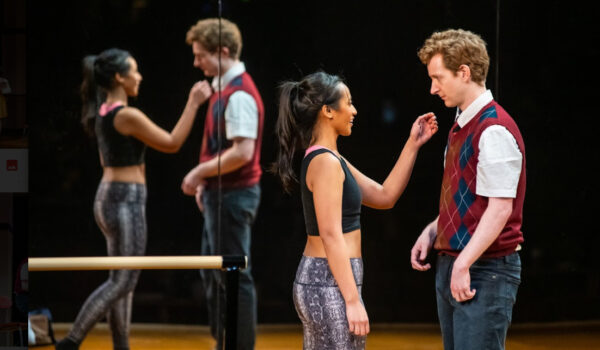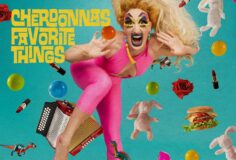It’s going to be tough, because as a person of the childish elder man persuasion, I very much enjoy making snarky, innuendo laced remarks about the title of the play currently onstage at the Seattle Rep. I mean, it’s a gold mine of possibilities when it comes to making giggly, dirty minded commentary about such a provocative title.
Which is obviously why the play has that name.
Teenage Dick.
The original name apparently came from actor Gregg Mozgala, the artistic director of Apothetae, a New York based theater company that creates theater work for disabled actors. He had an idea for a new play: adapt Shakespeare’s Richard III to an all-American high school setting and build a play around an ambitious and intelligent disabled teenager named Richard coping with the rigors of life in that environment. Oh, and he came up with a name for this idea: “Teenage Dick” and brought on playwright Mike Lew to bring it to life. And, with the mandate to “re-examine tired tropes about the disabled, create stories for people we’re not otherwise seeing, hire more disabled artists, and carry out a ground-up reconsideration of how theatres embrace the mantle of inclusion.”
Which is a pretty strong foundation to create new work.
After a long creation process, the play finally debuted at the Public Theater in 2018 with Mozgala in the leading role and the plot centered on Richard as a 17 year old high school junior with cerebral palsy who is highly intelligent but also emotionally crippled by years of being bullied for having a disability. He plots revenge on all who have mocked him by deciding to use principles from Machiavelli’s 16th century political treatise, The Prince to secure his winning the office of class president…even if that means being devious and underhanded.
Richard tries to bring his friend Barbara Buckingham aka “Buck”, who is also disabled and in a wheelchair, into his scheme and she aids him to a certain degree but begins to feel betrayed by the fact Richard is using her to achieve his goals. He’s also aided by their daffy teacher Ms York who would like to see Richard win the race so he can defeat the current president, popular jock/bully Eddie Ivy. There’s also a third candidate for class president, the annoying Christian girl Clarissa Duke who is not as pious as she seems.
Richard makes some progress in his goals of winning the election but things get complicated when he pursues Eddie’s former girlfriend, Anne Margaret, who broke up with the jock over the winter holidays for mysterious reasons. Both Richard and Anne develop feelings for each other which proves problematic for Richard who is torn between his attraction for Anne and his ruthless need to destroy Eddie.
It’s all based on Richard III, or rather, Shakespeare’s version of the very real king of England, so things get messy along the way. Which, is actually a good thing, and part of the original mandate for the creators of Teenage Dick, to create a complicated disabled character who is more than a passive supporting bystander, or a best friend, or a noble victim, or comedy relief. That really is the primary strong suit for this play; Richard IS a complicated, nuanced, passionate character with faults and frailities. You care about “Dick” even when he does dreadful things.
But, while the character of Richard is fascinating and compelling, that really can’t be said for the rest of the characters who do seem to just BE there for the sake of having someone for Richard to interact with…most of them aren’t very interesting and the bully character is just a dreary, cardboard cliché. The teacher and the annoying Christian girl are only there to provide comedy relief. Playwright Lew does give some life to “Buck” the best friend in a wheelchair, but the character sort of fades away as the play progresses (and, she’s bit wishy/washy as well). And, while there is some dimension to the Anne character, it’s not necessarily a very believable one. Despite the fact the character has a big speech towards the end of the play that she is in fact, more than just your typical vaguely drawn Shakespeare female character, she doesn’t really have that much more depth than the Anne from Richard III. She’s still a plot device.
As for this specific production, it’s quite strong with a solid cast led by MacGregor Arney as Richard, an actor who does have cerebral palsy. He’s the center of the entire piece and the only character that is actually well drawn and fleshed out and he has a lot to play with here, within the parameters of the text and the character. It’s a vibrant, sly performance with great charm and wit while also exploring the darkness of Richard’s actions.
I also liked Rheanna Atendido’s Anne, though her character never seems very real, or at least not to the extent that Richard feels like a fully formed person. Meme Garcia and Erika Vetter were both very funny as, respectively, the obnoxious Clarissa and daffy teacher Ms York though they don’t have much to do other than “be funny”. Both characters feel a bit cardboard-y though not as much as poor Eddie, the bully character. Michael Monicatti does what he can with a character that doesn’t really ever arise above stereotype plot device. Meredith Aleigha Wells as “Buck” the wheelchair using friend of Richard was fine but again, the character felt underused and underwritten if not a bit flat.
Yet another gripe: for anyone who’s ever seen any film or television series about high school life, there’s not much here we haven’t seen before plotwise. And, really, specifically, this play borrows an awful lot from Alexander Payne’s excellent 1999 comedy film, Election which starred Matthew Broderick as a frustrated high school teacher determined to stop the machinations of a monstrously ambitious student named Tracy Flick (Reese Witherspoon in a career defining performance) from winning the office of class president. The play slyly alludes to other high school based works but…acknowledging that you’re aware that you’re “paying homage” to those other works really any better than just admitting you’re not being that original?
And, like most plays about “kids” and their lives, the material already feels a bit dated. The play relays on the use of social media as a plot device within the plot and social media and its use by teens changes drastically over time. Even though the creators of this play are apparently all Millennials, they’re also OLD Millennials. This play, created over a period of time in the mid 2010s by people in their 30s doesn’t seem that contemporary in 2022.
Kids don’t use Twitter!
OLD people use Twitter!
So, it’s a mixed review. I like the title (really, the best thing about the entire project) and I like the IDEA of the project. Their original mandate is a good one…to create theater opportunities and strong roles for disabled actors. The character of Richard is a solid and compelling one (which is why we’ve been seeing productions of the Shakespeare play for hundreds of years) and the creators have done some interesting things in creating their version of the character. It’s a dream role for the actor who gets to play it.
But, the plot of the play does start to fall apart by the end. The uneveness of that plotting led to some awkard staging from the director of this production, Malika Oyetimein. There’s a brutal but unconvincing fight scene that I especially disliked and the final wrap up of the material is clunky and awkward including a final tableau of all the characters that just felt forced and phony.
The production does have great energy and interest…it’s certainly not boring. My goal here is to relay my reactions to the material and the specific production. All opinions are subjective, something many of us forget from time to time especially in the Age of Social Media. It’s really just a question of…remembering to properly hashtag our thoughts and feelings:
#DecideForYourselfWhatYouWantToSee
#TeenageDickIsAHilariousTitle





















